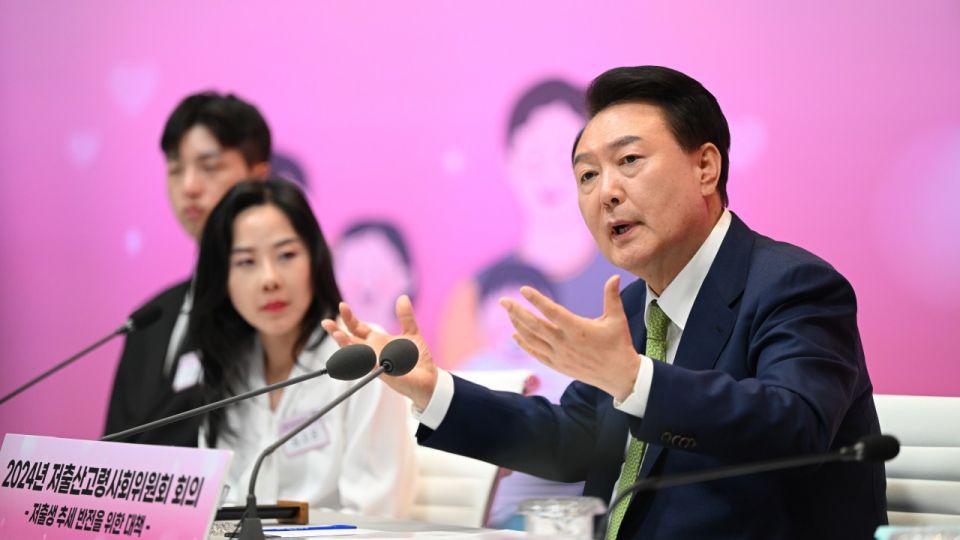June 20, 2024
SEOUL – President Yoon Suk Yeol declared a “national emergency on population” Wednesday, rolling out measures to expand cash support for newborn babies and reverse the declining birth rate trend.
“The population crisis caused by extremely low birth rates is the foremost and critical issue for South Korea,” Yoon said, adding that the rapid population decline has now become a matter “prompting concerns about the very survival of South Korea.”
Yoon made the announcement during a meeting of the Presidential Committee on Aging Society and Population Policy, which he chairs, alongside representatives from the Finance Ministry and Welfare Ministry at the HD Hyundai Global R&D Center in Bundang, Gyeonggi Province, Wednesday. This was the first population committee meeting Yoon personally convened since March 2023.
According to Yoon, the new measures stem from a thorough reassessment of the government’s past efforts to boost the country’s birth rate, which have proven ineffective despite substantial investments. In the first quarter, Korea’s fertility rate — the number of children a woman has within her lifetime — hit a record quarterly low of 0.76, and it is projected to drop to another fresh low of 0.68 this year.
Recognizing the urgency of the issue, Yoon said the government is launching a comprehensive emergency response system.
This includes establishing the Population Strategy Department, the new ministry Yoon had pledged to create last month when marking his second presidential anniversary.
According to the new plans, the head of the new ministry will also serve as the Deputy Prime Minister for Social Affairs, a role currently held by the Education Minister, to oversee the development of national strategies addressing population issues and broader social policies in education, labor and welfare to tackle the low birthrate.
Additionally, a senior presidential secretary position dedicated to tackling low birth rates is to be created.
The government highlighted its policy efforts in three core areas: work-life balance, child care and housing.
First, to support parents in balancing work and childcare responsibilities, two weeks of short-term child care leave will be introduced for emergencies, such as when children fall ill. Additionally, the age limit for reduced working hours during child care will be raised from 8 years old to 12, with the maximum period extended from 24 to 36 months.
To encourage fathers’ involvement in child care, paternity leave after childbirth will increase from 10 days to 20 days. Fathers will also be able to take leave during their wife’s pregnancy under specific conditions, rather than only after birth.
Yoon also aimed to increase the paternity leave usage rate from 6.8 percent to 50 percent within his term and raise the female usage rate from 70 percent to 80 percent.
Furthermore, the child care leave pay cap for the initial three months will be raised to 2.5 million won ($1,800) from the current 1.5 million won. This amount will decrease to 2 million won in the subsequent three months and to 1.6 million won over the following six months. Additionally, to support employers, the monthly subsidy for hiring replacement workers will increase to 1.2 million won.
Second, President Yoon committed to the government taking responsibility in supporting child care and vowed to gradually implement a public child care system covering children from birth to 11 years old within his tenure.
To achieve this, the government will provide free education and care for children aged 3 to 5, expand after-school programs to all elementary school grades nationwide by 2026 and incrementally increase free program offerings.
Addressing the shortage of domestic caregivers amid population decline and aging, the government aims to significantly boost the availability of both public and private caregivers, targeting 300,000 households by 2027. This initiative includes recruiting 1,200 foreign domestic workers by the first half of next year and facilitating foreign students and spouses of foreign workers to participate in caregiving roles, with 5,000 individuals involved in the pilot program.
The government will also explore measures to enable private agencies to recruit, mediate and manage foreign caregivers from abroad.
Yoon underscored the government’s commitment to tackling housing issues for newlyweds and families with children. Initiatives include expanding housing allocations for households with newborns to 120,000 units and developing new housing sites tailored for newlyweds and families with newborns or multiple children.
The government will streamline access to home purchase and rental loans for those with newborns and offer improved preferential interest rates for each birth. Additionally, to reduce financial barriers to marriage for young people, a new marriage tax deduction will be introduced and child tax deductions expanded.
President Yoon stated that the “emergency population response meeting” will be convened monthly by the population committee to review policies until the launch of the Population Strategy Department.
Meanwhile, Wednesday’s discussion was also attended by Minister of Employment and Labor Lee Jung-sik, Education Minister Lee Ju-ho, and Minister of Land, Infrastructure and Transport Park Sang-woo, alongside various representative policy stakeholders including working mothers, fathers of multiple children and representatives from corporate entities, such as HD Hyundai Chairman Kwon Oh-gap and HD Hyundai Vice Chairman Chung Ki-sun.
Ahead of the meeting, Yoon also visited Dream Boat, the company day care center located inside HD Hyundai’s building.


